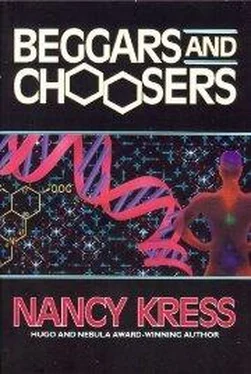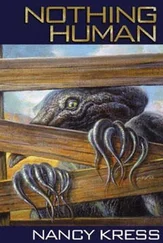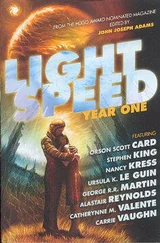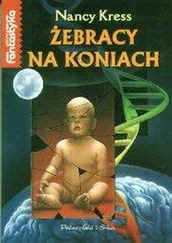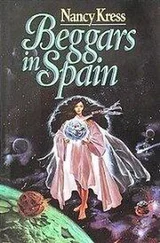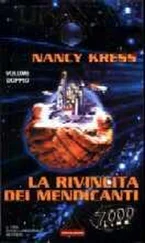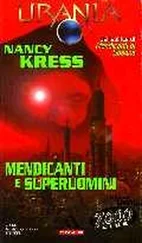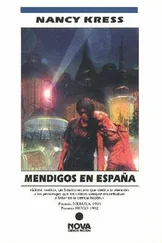Jack didn’t say nothing. Ben Radisson nodded, him, real slow, looking right at me. He’s a good man. That’s why I let him hear.
The rabbit meat squished against my chest, inside my coat. Nobody could smell it. Nobody could see the bulge, them, because it was after all just a small piece of meat, a measly rabbit, pathetic as dirt. Lizzie was hungry. Annie was a big woman. I was going, me, to Coganville.
But I wasn’t going to tell Annie. She’d kill me, her, before I even got the chance to save her.
We started out, us, at first light, twelve people. More might scare the people of Coganville. We didn’t want, us, what they needed for themselves. Just the extra.
No, that ain’t true. We wanted, us, whatever we needed.
I got up from the sofa too quiet to wake Annie or Lizzie in the bedrooms. But Dr. Turner, on her pile of blankets in the corner, she heard me, damn her. A man can’t never .have no privacy from donkeys.
“What is it, Billy? Where are you going?” she whispered.
“Not to no Eden,” I said. “Lay back down, damn it, and leave me alone.”
“They’re going to another town for food, aren’t they?”
I remembered, me, that she’d said last night she was going down to the cafe. But I didn’t see her there, me. But they know things, donkeys. Somehow. You never know how much they know.
“Listen, Billy,” she said, real careful, but then she stopped like she didn’t know what I should listen to. I pulled on three pairs of socks before she got it.
“There’s a novel, written a long time ago—”
“A what?” I said, and then cursed myself, me. I shouldn’t never ask her nothing, me. She can out-talk me every time.
“A story. About a small worldful of people who believed in sharing everything in common. Until a famine struck, and people on a broken train needed food from the nearby town. The passengers hadn’t eaten in two days. But the townspeople didn’t have much food themselves, and what they did have they wouldn’t share.” The whisper in the dark room was flat, her.
I couldn’t help asking, me. I like stories. “What happened to the people on the gravrail?”
“The gravrail got fixed in the nick of time.”
“Lucky them,” I said. Wasn’t nobody going to fix our gravrail or cafe kitchen. Not this time. Dr. Turner knew that, her.
“It was a fairy tale, Billy. Brave and inspiring and sweet, but a fairy tale. You’re in a real United States. So take this with you.”
She didn’t say not to go, her. Instead she gave me a little black box that she pushed onto my belt and it stuck there. I got a funny flutter in my chest, me. I knew what it was, even though I never wore one before, me, and never expected to. It was a personal energy shield.
“Touch it here” Dr. Turner said, “to activate. And the same place to deactivate. It’ll withstand damn near any attack that isn’t nuclear.”
Turned on, it didn’t feel like nothing. Just a little tingle, and that might have been my imagination. But I could see a faint shimmer around me.
“But, Billy, don’t lose it,” Dr. Turner said. “I need it. I might need it badly.”
“Then why you giving it to me, you?” I flashed at her, but I already knew, me. It was because of Lizzie. Everything was because of Lizzie. Just like it should be.
Anyway, Dr. Turner probably had another one, her. Donkeys don’t give away nothing unless they already got another one for themselves.
“Thank you,” I said, rougher than I meant, me, but she didn’t seem to mind.
The morning was cold and clear, with that kind of pink and gold sunrise that turns clean snow to glory. There wasn’t no wind, thank God. Wind would of bit deep. We tramped, us, along the gravrail track to Coganville. Nobody talked much, them. Once Jim Swikehardt said, “Pretty,” about the sunrise, but nobody answered.
At first the snow wasn’t too deep because the woods crowding the tracks on either side held the snow from blowing. Later it did get deep. Stan Mendoza and Bob Gleason carried Y-energy units, them, that they’d ripped out of some building, and they aimed them at the worst places and melted the snow. The units were heavy, them, and the men puffed hard. It was slow going, part uphill, but we did it. I walked last, me.
After two miles my heart pounded and my knees ached. I didn’t say nothing, me, to the others. I was doing this for Lizzie .
About noon clouds blew in and a wind started. I lost track, me, of how far we might of come. The wind blew straight at our faces. Stan and Bob turned the heating units around, them, whenever they could, and then we walked in warmer air that the wind whipped away as fast as it could.
I got to thinking, me, stumbling through the snow. “Why couldn’t. . . couldn’t. . .”
“You need to rest, Billy?” Jack said. I could see tiny ice crystals on his nose hairs. “This too much for you?”
“No, I’m fine,” I said, never mind that it was a lie. But I had to say, me, what I started. “Why couldn’t. . . the donkeys make lots of… lots of little heat units for us all to … c-carry—”
“Easy, Billy.”
“—c-carry around in our gloves and b-boots and jackets … in the winter? If Y-energy is really so … cheap?”
Nobody answered, them. We came to a big drift, and they turned the heat units on it. It melted real slow. Finally we just slogged, us, through what was left, snow to the waist, wetter and more sticky than it would of been if we hadn’t tried to melt it. Jack stumbled, him. Stan pulled him up. Judy Farrell turned her back to the wind to get a moment’s rest, and her cheeks were the red-white that is going to hurt like hell when it finally warms up.
Finally Jim Swikehardt said, real low, “Because we never asked , us, for lots of tiny heaters, and they only give us enough of what we ask for to keep our votes.” After that nobody said nothing.
I don’t know, me, what time it was when we got to Coganville. The sun was completely hid behind clouds. It wasn’t twilight yet. The town was quiet and peaceful, it, with nobody in the streets. Lights blazed in all the windows. We walked, us, up the main street to the Congressman Joseph Nicholls Capiello Cafe, and we could hear music. A holosign flashed blue and purple on the roof: THANK YOU FOR ELECTING DISTRICT SUPERVISOR HELEN ROSE TOWNS-END 1. It was like the world here was still normal, and only us was wrong.
But I didn’t believe that no more, me.
We went in to the cafe. It must of been too late for lunch, too early for dinner, but the cafe was full of people. They were hanging plastisynth banners and bows, them, for a scooter race betting night. Tables were pushed around to make booths and a dance floor. The smell of food from the belt hit us all the same time the warmth did, and I swear I saw tears, me, in Stan Mendoza’s eyes.
Everybody got real quiet, them, when we came in.
Jack said, “Who’s the mayor here?”
“I am,” a woman said. “Jeanette Harloff.” She was about fifty, her, skinny, with silver hair and big blue eyes. The kind of Liver who gets kidded about having secret genemods, even though you know she don’t. It’s just something people say, them. People can be damn stupid. But maybe that’s why this woman was mayor, her. Nobody wouldn’t just let her be one thing or the other.
Jack explained, him, who we were and what we wanted. Everybody in the cafe listened. Somebody had turned the holoterminal off. You could of heard a mouse walk.
Jeanette Harloff studied us, her, real careful. The big blue eyes looked cold. But finally she said, “The main gravrail’s busted, it, but we got a spur and it works. There’s another kitchen shipment coming in tomorrow. And our congressman can really be trusted, him. We’ll always have food, us. Take what you need.”
Читать дальше
